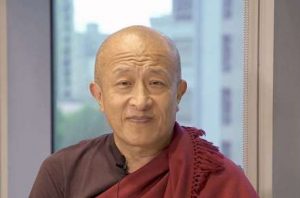
Recently, a friend expressed to me his concerns over the challenges we face in our world today. Political strife, international conflicts, and the looming threat of fires, floods and extreme storm systems. He was feeling overwhelmed and uncertain about his ability to handle the difficulties that life would certainly bring. After he expressed his concerns, we sat together in silence. And then it struck me. We don’t know what will happen; we do not know if all or none of the scenarios my friend was imaging would come to pass. And it does not matter. What does matter is that none of us can control the external world. You can vote, you can volunteer, you can hope for your preferred outcomes, yet the outcome may be one that you perceive as undesirable. Despite the chaos and uncertainty, there is a beacon of hope—the opportunity to build resilience. You can find solace and strength in the teachings of Buddhism. While you are not guaranteed rest from the external world, what you can find is refuge.
In times of difficulty and uncertainty, seeking refuge in the Triple Gem of the Buddha, the Dhamma, and the Sangha can provide a source of strength and guidance. When you take refuge in Buddhist practice, you are not seeking a physical sanctuary but rather a spiritual haven that offers support as you navigate the external world and your own internal responses to your experiences. When you take refuge, you align yourself with the teachings of the Buddha, the Dhamma (his teachings), and the Sangha (the community of practitioners). In this way you acknowledge the Buddha’s enlightenment, and strive to embody his teachings of compassion, wisdom, and mindfulness in your daily life. You embrace the Dhamma and recognize these teachings as the truth that will help you gain release from suffering. And by sitting with your Sangha you will know that you are not alone. You can find a kalyana-mitta, a noble friend. While the Buddha used this term to describe monks and friends within the holy life, you too can have noble spiritual friends; relationships in which you support one another in your practice.
Your refuge enables you to face life’s uncertainties with grace and equanimity. Seeking refuge will help you to:
Cultivate mindfulness: Through mindfulness, you develop a deeper understanding of your thoughts, emotions, and actions, leading to greater clarity and insight. By honing this skill, you can develop a deeper sense of self-awareness, reduce stress and anxiety, and enhance your ability to respond to situations with clarity and composure. Your goal is to accept the present moment as it is, without resistance or judgment. By cultivating acceptance, you can find peace amid the chaos, and focus on what you can control.
Embrace impermanence: By taking refuge in impermanence, you learn to accept the transient nature of all things, becoming calm in the ebb and flow of life’s experiences. Recognizing the impermanence of difficult times and cultivating non-attachment, you can develop resilience and adaptability, allowing you to gracefully weather life’s storms. Learning to let go will help to reduce the impact of external circumstances on your well-being.
Foster compassion and loving-kindness: By nurturing these qualities, you can strengthen your relationships, build social connections, and provide support during difficult times. Remember to start with yourself.
Find liberation from suffering: Ultimately, taking refuge offers a pathway to liberation from suffering. By following the Noble Eightfold Path and embodying the Four Noble Truths, you embark on a journey toward spiritual awakening and enlightenment.
Building the type of resilience that will carry you through calamity takes consistent work. That is why you rely on the Triple Gem, giving yourself more than one means of support. You are engaging in a form of strength training. Read the suttas to learn about the life of the Buddha and his teachings. Listen to a qualified teacher explain the depth behind the Four Noble Truths, the Noble Eightfold Path, and other concepts. Consider reciting chants or mantras while you exercise. Meditate on your own and with friends. Take a contemplative nature walk, by yourself or with a friend. And consider giving your time and other resources to help others in need. By including a variety of actions in your practice, you are providing yourself the opportunity to engage with your practice every day.
Navigating the chaos and uncertainty of today’s world can be daunting, finding refuge is essential for maintaining well-being and inner peace. Remember, no matter how turbulent life may be, taking refuge in your practice equips you with the tools to respond to adversity. Life will keep coming at you in ways that you cannot control. You don’t get to press “pause” on world events and environmental fallout. You might not have an opportunity to rest, which is exactly why you take refuge.
See more
Margaret Meloni: Death Dhamma
The Death Dhamma Podcast (Margaret Meloni)
Related features from BDG
Be Your Own Ally in Times of Loss
Dancing around Death: Meeting Denial with Courage and Compassion
Unlocking Wisdom through Life Reviews
Four Steps to Help You Accept the Death of Old Ideas
Related videos from BDG
The Death Dhamma Podcast Season 1
The Death Dhamma Podcast Season 2
The Death Dhamma Podcast Season 3
The Death Dhamma Podcast Season 4












